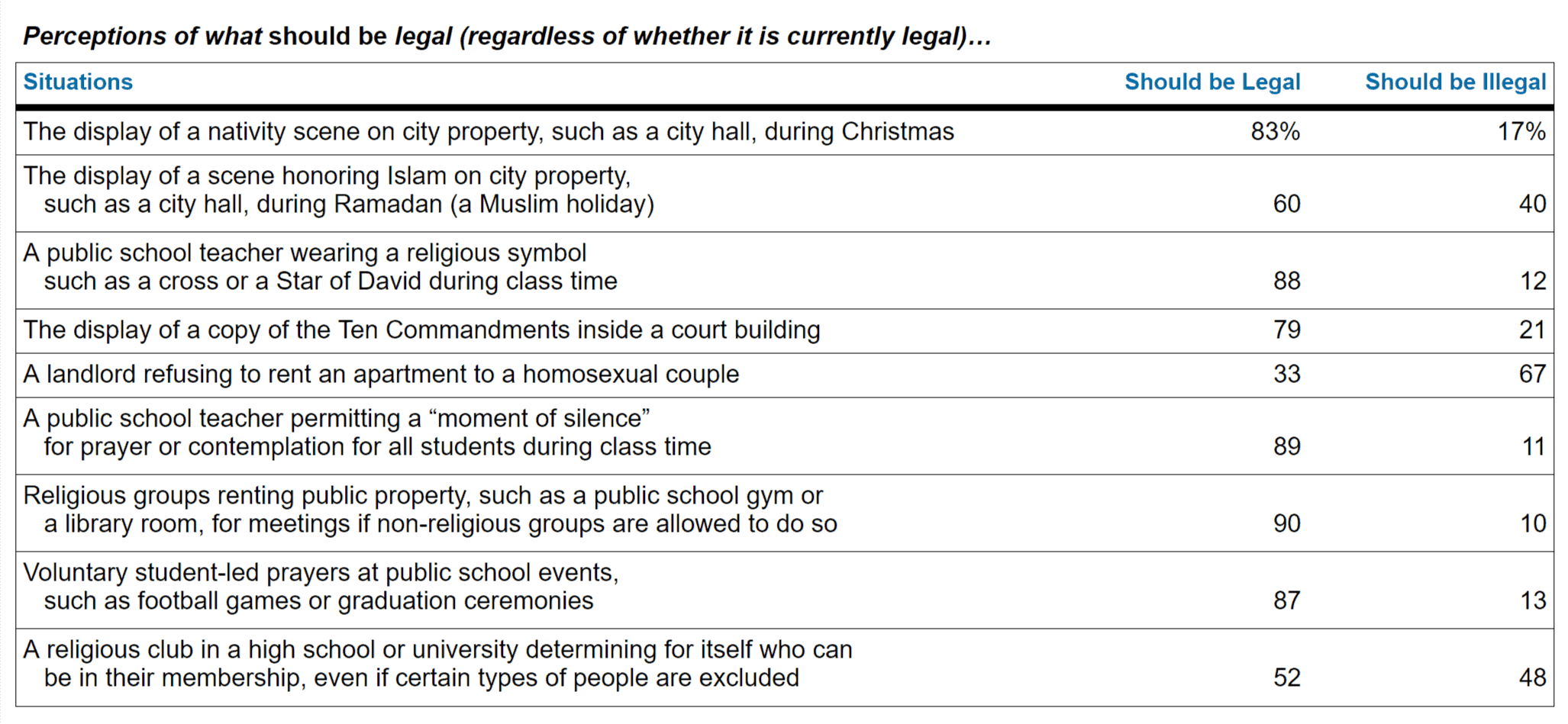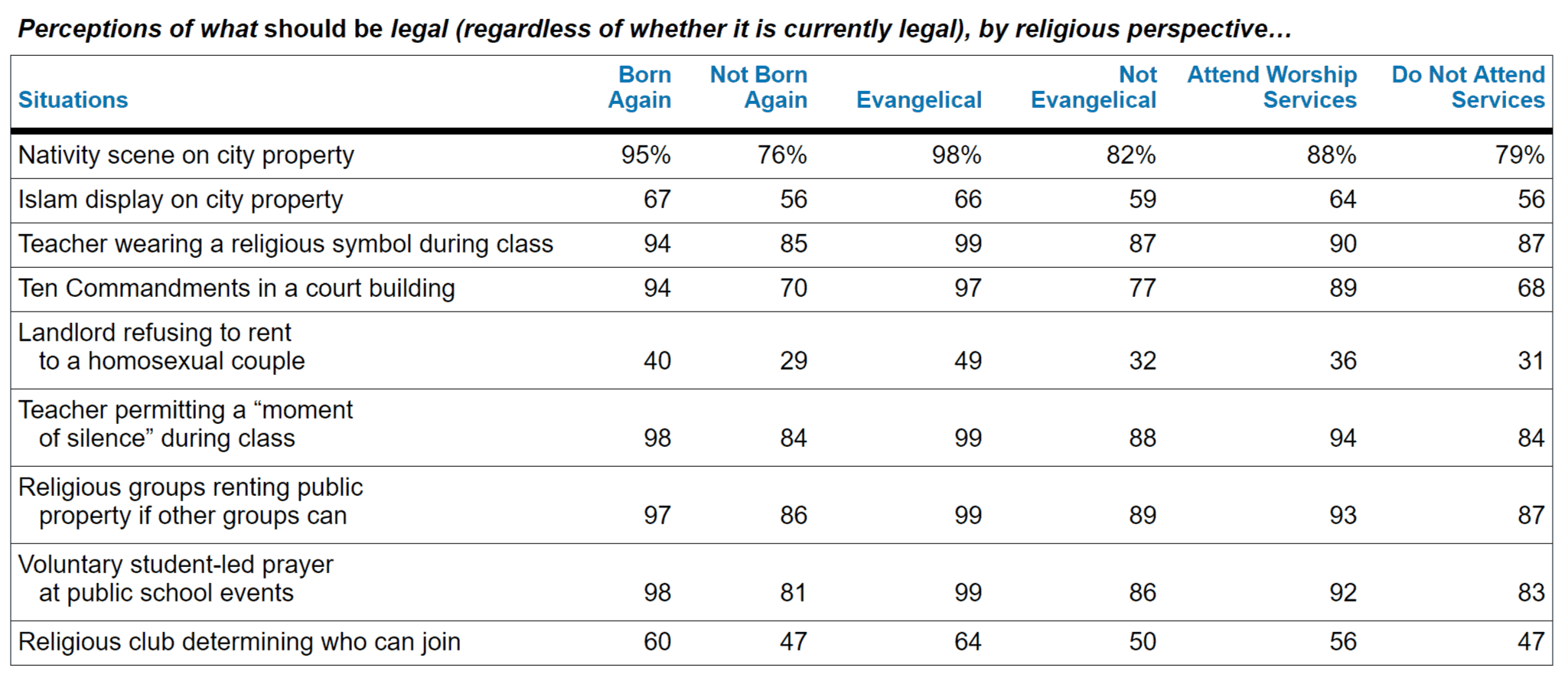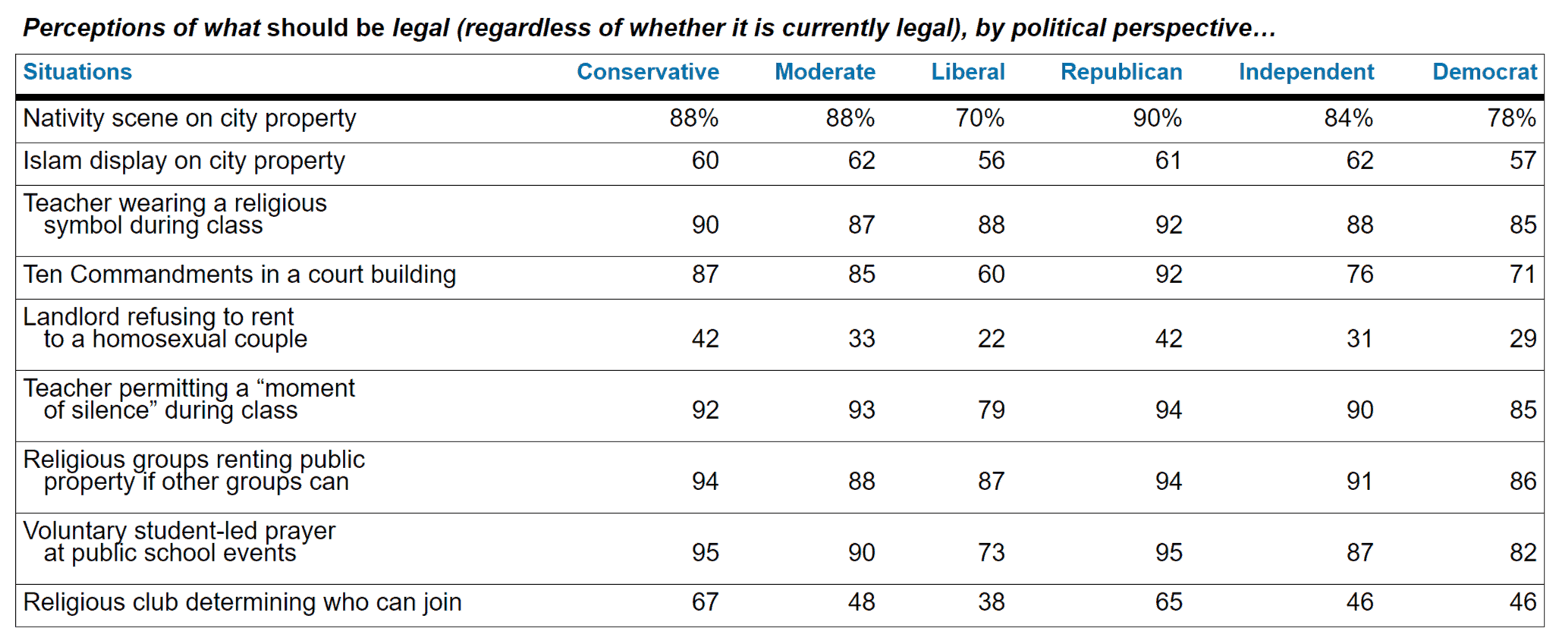Liberals and conservatives both want freedom of religious expression and practice
(Original release date: January 10, 2008) Study results released from Grey Matter Research & Consulting (formerly Ellison Research) of Phoenix, Arizona show the vast majority of Americans believe it should be legal to have voluntary student-led prayers at public school events, display the Ten Commandments inside a court building, and allow religious displays on city-owned property.
The findings are from a study independently designed and conducted by Grey Matter Research among a representative sample of 1,007 American adults. The sample is balanced by gender, age, income, race, and geography. The study presented a number of scenarios to people, and asked whether each one generally should or should not be legal in the U.S.
The results may be surprising not just in what perspective Americans take on each issue, but in how much unity of thought there is on many of the issues:
- 90% feel the law should support religious groups renting public property, such as a public school gym or a library room, for meetings if non-religious groups are allowed to do so
- 89% say it should be legal for a public school teacher to permit a “moment of silence” for prayer or contemplation for all students during class time
- 88% believe it should be legal for public school teachers to wear religious symbols, such as a Star of David or a cross, during class time
- 87% say voluntary student-led prayers at public school events, such as football games or graduation ceremonies, should be legal
- 83% believe the display of a nativity scene on city property, such as city hall, should be legal
- 79% say it should be legal to display a copy of the Ten Commandments inside a court building.
Out of nine such scenarios presented to people in the study, only three do not show this level of unified thought:
- 60% believe the display of a scene honoring Islam on city property, such as a city hall, during Ramadan (a Muslim holiday) should be legal (even though 83% thought a nativity display should be legal)
- 52% believe it should be legal for a religious club in a high school or university to determine for itself who can be in their membership, even if certain types of people are excluded
- 33% say it should be legal for a landlord to refuse to rent an apartment to a homosexual couple
It may not be surprising that highly religious Americans, as well as those who have a conservative political viewpoint, strongly support individual religious and moral rights. What may be surprising is the high proportion of non-religious Americans, and those who have a more liberal political viewpoint, who share this perspective.
For instance, 92% of people who regularly attend religious worship services believe voluntary student-led prayers at public school events should be legal, but 83% of those who do not regularly attend worship services also believe this. Solid majorities of people who do not attend religious services also believe it should be legal to have a moment of silence in public school classes, for teachers to wear religious symbols during class, for religious displays to be allowed on city property, for religious groups to have equal access to public facilities, and for the Ten Commandments to be displayed inside a court building.
Some of these scenarios get positioned as issues championed by evangelical Christians, but this is only part of the truth. Evangelicals are significantly more likely than other Americans to believe most of these scenarios should be legal in the U.S. today. However, non-evangelicals usually have the same perspective as evangelicals – just with majorities that are not as strong. For instance, 97% of evangelicals believe it should be legal for the Ten Commandments to be displayed inside court buildings, but 77% of non-evangelicals also believe this should be legal.
What may be most surprising is when the scenarios are viewed according to political affiliations and beliefs. Ninety-five percent of those who describe themselves as politically conservative believe voluntary student-led prayers at public school events should be legal. This same perspective is held by 90% of self-described moderates, and even 73% of those who call themselves liberal. Eighty-eight percent of conservatives believe nativity scenes on city property should be legal, as do 88% of moderates, and 70% of liberals.
The picture doesn’t change when party affiliation is substituted for political viewpoint. Ninety-five percent of Republicans believe voluntary student-led prayers at public schools should be legal, along with 87% of independents, and 82% of Democrats. Ninety-two percent of Republicans believe teachers should legally be allowed to wear symbols of their religious faith during class time, along with 88% of independents, and 85% of Democrats.
Indeed, the majority of Democrats and self-described political liberals believe the law should allow nativity scenes on city property, displays honoring Islam on city property, displays of the Ten Commandments in court buildings, teachers wearing religious symbols, moments of silence for prayer or reflection during class times, equal access to public facilities for religious groups, and voluntary student-led prayers at public school events.
The study also shows a gap between what people feel should be legal regarding Christianity and other religions (in this case, demonstrated by the fact that 83% say a nativity scene on city property should be legal, but only 60% say a display honoring Islam during Ramadan should be legal). Overall, 58% of all Americans feel both should be legal, while 15% feel both should be illegal. One percent believe honoring Islam should be legal while a nativity scene should be outlawed. However, 25% of all Americans say a nativity scene should be legal, but not a display honoring Islam.
Americans who feel a nativity display should be legal but not a display honoring Islam tend to be women age 35 or older who are either conservative or moderate politically. However, this perspective does not hinge on religious belief or practice – evangelicals, born again Christians, and people who attend worship services are not significantly more or less likely than others to say a nativity scene on city property should be legal, but not a display honoring Islam.
Ron Sellers, president of Grey Matter Research, believes there are a number of things to learn from these results. One is that the labels placed on people often don’t accurately define who they are and what they believe. “There’s too often a stereotype in today’s world that one side – be they defined as churchgoers, conservatives, the ‘religious right,’ Republicans, evangelicals, or whatever – want to turn the U.S. into a theocracy or shove religion down everyone’s throats, while the other side – again, be they called Democrats, the non-religious, liberals, or the unchurched – are anti-religion and fighting to make this a purely secular society. On most of these issues, these different groups have a lot more in common than the stereotypes would suggest – most people simply support the right to individual religious expression, even if another person may not like that expression.”
Sellers also noted that this study can be seen as being about individual freedoms, rather than just religion. “By definition, giving rights to one person means taking rights away from another. If I have the right to paint my house any color I want, my neighbor loses the right not to have to look at a purple house. Americans clearly come down on the side of freedoms and rights for individuals and groups, and against restrictions. They believe in the right of a student to express herself at graduation, or the right of a church to rent a public school gym for its services, or the right of a public school teacher to wear a Star of David on his lapel. The majority feels those who don’t wish to listen to a prayer at graduation or see the Ten Commandments in a court building have the right to ignore these things – but not the right to stop others from expressing themselves.”
He also cautioned that the findings from this study do not say Americans support individual rights and freedoms at all costs. “This research is not a legal document with exact definitions of individual cases, but a generalized idea of what Americans believe,” Sellers explained. “Because people believe in a teacher’s right to wear a religious symbol does not necessarily mean that would apply no matter what the symbol, how it’s displayed, etc. It means in general, they believe teachers should have that right of personal expression. But Americans also take into consideration how their own freedoms impact others. For instance, one-third feel a landlord should have the right to do with his property what he wishes, while two-thirds disagree if that means a homosexual couple loses the right of equal access to housing.”
Study Details:
The study was conducted by Grey Matter Research (formerly Ellison Research), a marketing research company located in Phoenix, Arizona. The sample of 1,007 adults is accurate to within ±3.1 percentage points at the 95 percent confidence level with a 50 percent response distribution.
The study was conducted in all 50 states. Respondents’ age, household income, geography, racial or ethnic background, and gender were carefully tracked to ensure appropriate representation and accuracy.



